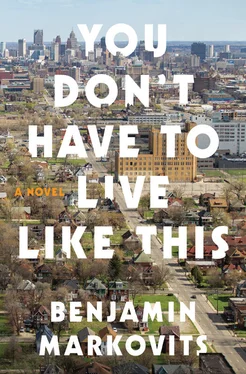“I know what you mean,” I said. “I’m tired, too.”
Cris told me to sit in front. And then, after buckling Michael in and buckling herself, she said, “You were kind of quiet-drunk last night. Are you hung over?”
“I don’t know. I think I talked too much.”
I closed my eyes and pretended to sleep. When we hit the highway, I fell asleep properly and only woke up when Tony pulled into his drive. Michael was also asleep and Cris very slowly and carefully lifted him out. I felt for the kid. She laid him out gently in his stroller and started walking him around. “I’ll just drive Marny home and come straight back,” Tony said and pulled out again.
“I’m supposed to stay in Johanna Street tonight.”
“What do you mean, supposed?”
“Well, Walter’s coming up tomorrow and that’s what I told myself I was going to do.”
But he dropped me at Robert’s place because I had to pack up. Which is how I spent the afternoon: going through the house and collecting my things, sometimes from other people’s bedrooms. There wasn’t much, a couple of boxes of household goods, a duffel of clothes, a few books and CDs, some of which I had loaned to other people. Even though no one was home I knocked on their doors.
In Beatrice’s room I sat down on her bed, which was fully made up, and then took off my shoes and lay down on it. I was still very tired. I could smell her on my skin from the night before then realized it was only her sheets. The novel on the bedside table had a bookmark sticking out of it — a postcard from her mother, with a picture of Frank Sinatra on the front, smiling into a microphone.
The note itself was prettily legible, effusive in a faintly foreign way. “Darling, how wonderful it was to see you. .” etc. and then I noticed the date: the twenty-ninth of November 1993—a few days after Thanksgiving break freshman year. This was several months before I met Beatrice coming out of seminar on the way to lunch. We stood in the melting snow, talking and getting colder; I tried not to show it. But it was like a window had opened up and let in some of that cold air.
Eventually I got bored of lying there and went round the rest of the house. Robert’s bedroom was surprisingly messy. There were clothes all over the bed, shirts, pants, socks, etc., probably from when he was packing his overnight bag. There were papers all over his desk, too, bills, printouts, and a letter from Clay Greene. Clay once explained to me why he still wrote letters. Every time I send an email, he said, I imagine cc’ing the editor of The Washington Post , because it isn’t going to disappear and sooner or later somebody will find it.
His letter to Robert was mostly about a guy called Stanley Krause, who worked at Goldman Sachs. Goldman had invested a good deal of money in Robert’s consortium, and they were interested in some of the warehouses and factory buildings Robert had been buying up, for their own use. Stanley wanted to make sure they “had their name down”—this was Clay’s way of putting it. “It’s worthwhile humoring these people,” he went on. I wondered if this is what Robert meant by temporary concerns. But there was also a picture on his desk of Peggy and little Ethan, swinging together on a swing in Central Park, with the tall blurry fence of the reservoir behind them. They seemed likely candidates, too.
AROUND FOUR O’CLOCK I THREW my duffel in the passenger seat, put my boxes in the trunk, and drove the ten blocks south to Johanna Street.
Every time I came back to the house I looked for signs of a break-in, but it seemed in good shape. The paint job looked almost sticky. Shrubs poked out of the beds in the front yard and the grass had the blue-green underwater appearance of a first growth. I brought my stuff inside, up the porch steps then up the hallway staircase to the second floor. The first thing I did coming in was check the wall phone in the kitchen for a dial tone. It flatlined, so I dialed up Robert on his cell.
“Listen,” I said, “are you still at Bill’s? Because I forgot something by the phone, a number. It’s on a subscription card.”
There was a wait and footsteps while he carried his phone downstairs.
“When did you take off?” he said. “I thought you were sticking around.”
“Tony gave me a ride home.”
He started reading out the 800 listing.
“Not that,” I said. “There should be something else, maybe on the other side. In ballpoint— Wait a minute, I gotta find something to write with.”
This turned out to be not so easy. The place was totally unlived in, but there was still the usual mess of junk mail and utility bills on the kitchen counter. Nothing to write with, though. No dried-out felt-tip or uncapped Bic, no golf pencils. “Hold on, hold on,” I called out, “listen, I’m going to have to call you back,” before I realized I could type it into my computer, which is what I did. Afterwards I said, “This isn’t really why I called. I wanted to say thank you. I’m in Johanna Street right now. I’m moving in. It looks great. My first grown-up apartment.”
“Take care of yourself, Marny. I don’t want to see you on the news.”
“You guys having a good time? Have you been swimming?”
“It’s very relaxed,” he said. “We’re all very relaxed.”
After hanging up, I poured myself a glass of water from the kitchen tap. All the appliances were brand-new. Hector and one of his cousins, a kid named Ziggy, had driven me out in his truck to the Ikea in Canton. We came back with a bed, a sofa, a coffee table, plates, pots, glasses, knives, forks, plants, etc. Ziggy helped put it all together, he was a real helpful kid. One of these guys who takes over this kind of job if you let him. So I let him. But he liked talking, too. When they hear you’re a teacher or used to teach, people sometimes open up to you, a lot of our important decisions and failures involve school. So he worked and I asked him questions.
Ziggy spent a couple of years at North Texas, where he majored in merchandising. Then one summer he got his high school girlfriend pregnant, ex-girlfriend really, and instead of going back to Denton he stayed in Galveston. By this point anyway he was thirty grand in debt and three semesters short of graduating. Three fucking semesters. She had a job at Payless ShoeSource, which she quit, and the manager was a friend of theirs so he took her place. That was two years ago. They were living at home with her mother, in a two-bedroom apartment, the baby was walking, there was plastic everywhere, Ziggy spent his whole life kicking things over and picking them up again. He started getting acid reflux, which sounds like no big deal, but after every meal he wanted to lie down in a dark room. It’s this funny thing about pain, he said. You want to be alone with it, you don’t want to move, you don’t want to do anything except hang out with this pain.
It’s all in your head, his girlfriend’s mother said, which is stupid. She’s somebody who doesn’t agree with or believe in simple scientific facts, but it’s true he was depressed. So when his cousin said, come to Detroit, he said, okay. His girlfriend was still in Galveston with their son, but he kept trying to persuade her. Every day he sent her pictures of the house on his phone; he was building a hot tub in the garden. But he took pride in my apartment, too. “We did a good job,” he said.
For some reason the thought of Ziggy put tears in my eyes. I was still hungover, emotionally drained, but with my feelings very close to the surface. Ziggy seemed to like me, we were both starting over, and already I had entered into new relations with people — the kind of people I didn’t use to know. You’re doing okay, I thought, keep going. Then the doorbell rang, and I looked out the living room window to see who was there.
Читать дальше












